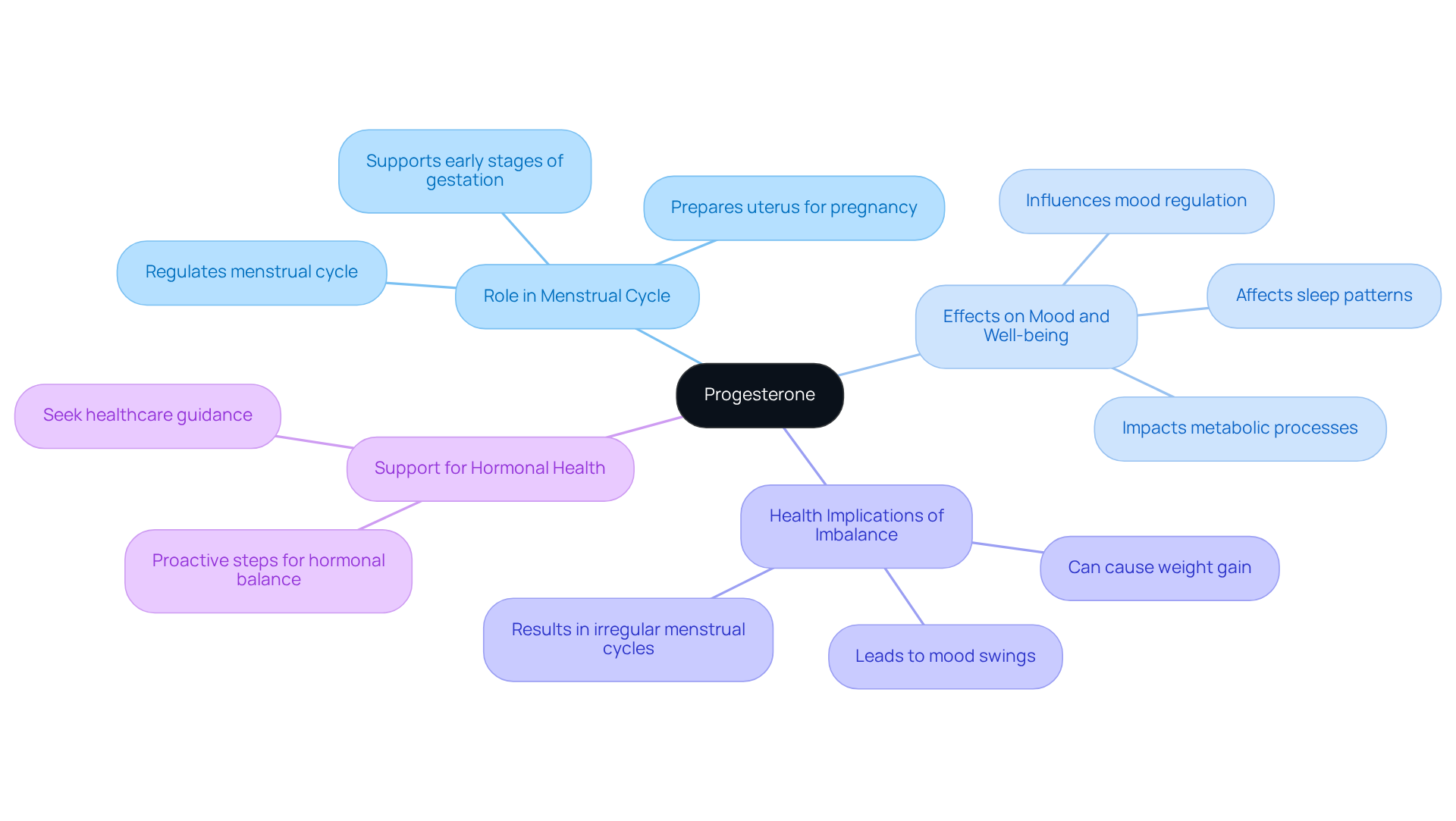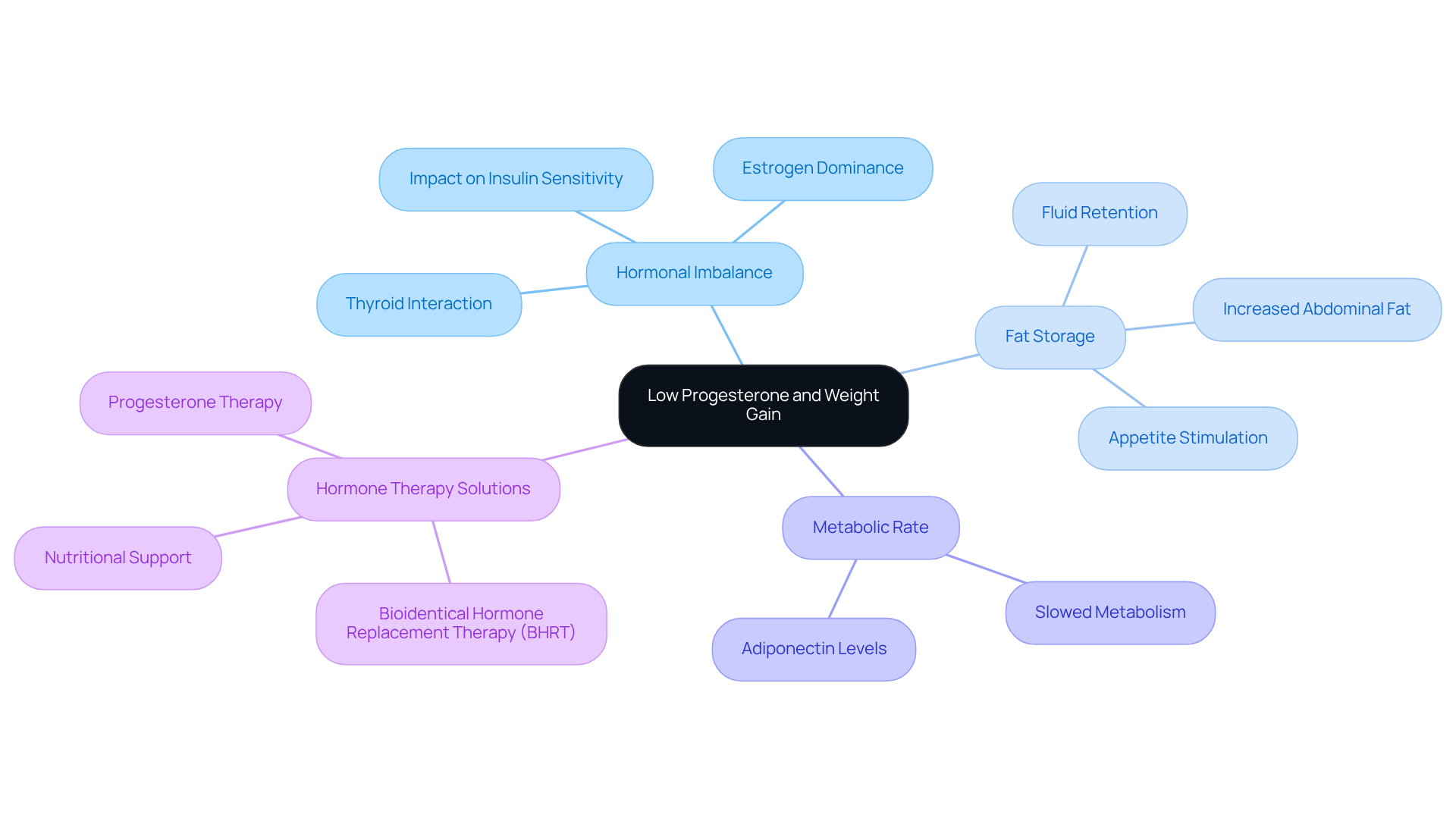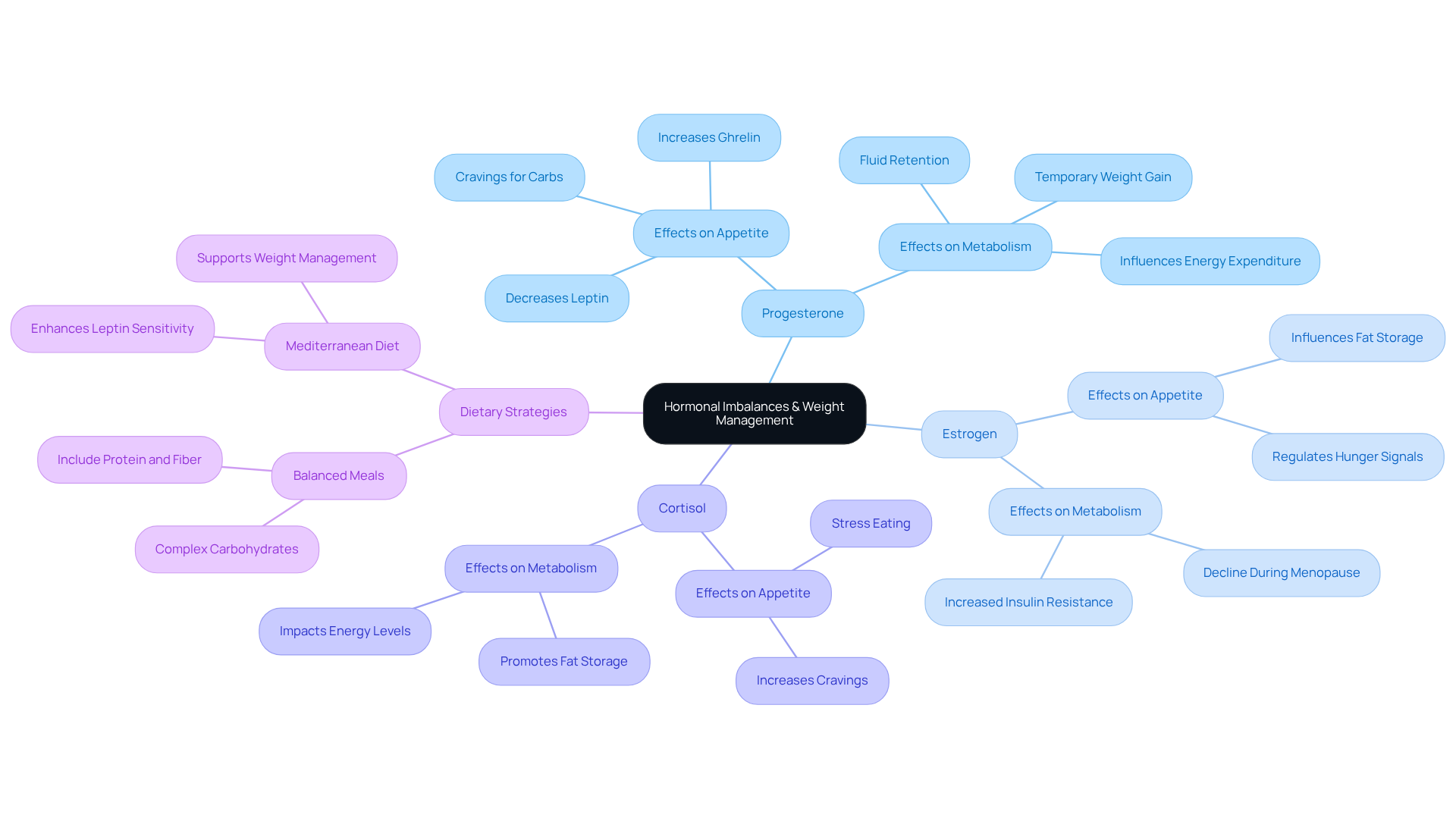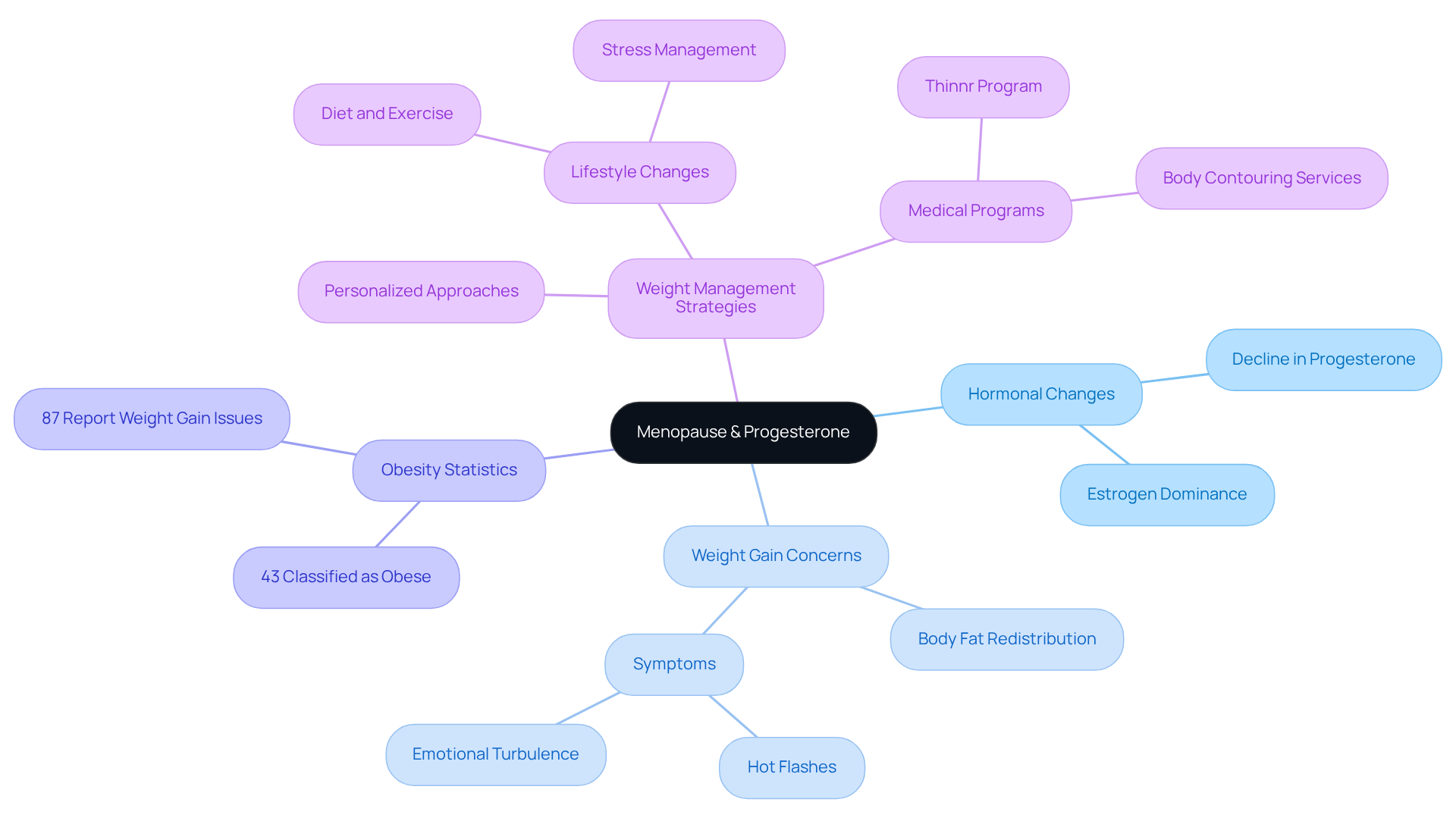Introduction
The delicate interplay of hormones is crucial to women’s health, with progesterone taking center stage in this biological orchestra. As a vital regulator of the menstrual cycle and a key player in pregnancy, its fluctuations can significantly impact mood, metabolism, and even body weight. Many women find themselves facing the challenges of low progesterone, leading to a pressing question: does low progesterone cause weight gain?
This article explores the intricate relationship between progesterone levels and weight management. We’ll delve into how hormonal imbalances can disrupt appetite, metabolism, and ultimately, body composition. Together, we can uncover not only the hurdles that many face but also the potential pathways to reclaiming hormonal balance and achieving a healthier weight.
We understand that navigating these challenges can feel overwhelming, but you’re not alone. By addressing these concerns, we can work towards solutions that support your wellness journey.
Define Progesterone and Its Role in Women’s Health
Progesterone is a steroid hormone that plays a crucial role in women’s health, primarily produced in the ovaries during the luteal phase of the menstrual cycle. Understanding its importance can help you navigate the challenges of hormonal fluctuations. This hormone is essential for regulating the menstrual cycle, preparing the uterus for pregnancy, and supporting the early stages of gestation.
Furthermore, progesterone influences various aspects of your well-being, including mood regulation, sleep patterns, and metabolic processes. Have you ever noticed how your mood shifts throughout your cycle? These changes are often linked to the fluctuating levels of progesterone. It’s important to recognize that these hormonal shifts can impact your daily life, especially during significant life stages like puberty, pregnancy, and menopause.
In addition, imbalances in progesterone can lead to health issues such as weight gain, leading to the concern of whether low progesterone will cause weight gain, along with mood swings and irregular menstrual cycles. We understand how frustrating this can be. By comprehending the diverse functions of progesterone, you can take proactive steps toward maintaining your hormonal balance and overall health.
Together, we can explore ways to support your hormonal health. If you’re experiencing symptoms that concern you, consider reaching out to a healthcare professional who can guide you on your wellness journey. Remember, you’re not alone in this — we’re here to help!

Examine How Low Progesterone Contributes to Weight Gain
One question that arises is whether low hormone levels will low progesterone cause weight gain, as they can lead to a series of physiological changes that may significantly contribute to weight gain. Many people struggle with the imbalance between estrogen and another hormone, often referred to as estrogen dominance. When certain hormone levels drop, estrogen can rise disproportionately, which can lead to increased fat storage, especially around the abdomen. This imbalance not only promotes fat accumulation but can also cause fluid retention, resulting in temporary weight gain due to bloating.
Furthermore, research indicates that low progesterone levels may slow down metabolic rates, raising the question of whether will low progesterone cause weight gain, making it even more challenging to maintain or lose weight. For example, studies have shown that reduced adiponectin levels in obese individuals are linked to lower insulin sensitivity, complicating body mass management. These factors create a difficult environment for managing body weight, particularly during menopause.
At Woodlands Wellness & Cosmetic Center, we understand these challenges. We offer comprehensive hormone therapy treatments, including progesterone therapy, which may provide a solution for those experiencing hormonal imbalances. Our dedicated team is here to provide personalized hormone replacement therapy, helping you achieve optimal wellness and effectively address concerns related to body composition.
Together, we can navigate these challenges and work towards a healthier you. If you’re ready to take the next step in your wellness journey, reach out to us today!

Analyze Hormonal Imbalances and Their Impact on Appetite and Metabolism
Hormonal imbalances can deeply affect your appetite and metabolism, often leading to unwanted weight gain. We understand how challenging this can be. Hormones like progesterone, estrogen, and cortisol play crucial roles in regulating these processes. When hormone levels drop, it’s common to experience increased cravings, especially for carbohydrates, making it tough to stick to a healthy diet. For instance, during the luteal phase, rising levels of a specific hormone can boost ghrelin, the hunger hormone, while lowering leptin, which signals fullness. This shift can lead to cravings for high-carb, sugary, and salty foods, complicating your efforts to manage your weight.
Research shows that low progesterone levels can hinder effective calorie burning, which raises the question of whether low progesterone will cause weight gain. Studies indicate that hormonal changes can impact energy expenditure and fat storage, making it harder to maintain a healthy body mass. For example, during the menopausal transition, women may see their resting metabolic rate drop by 300-400 calories a day, adding another layer of difficulty to weight management. Many women report heightened cravings and struggles with dietary adherence during this time, leading to frustration and raising the concern of whether low progesterone will cause weight gain.
Real-life experiences highlight this connection: numerous women have found that addressing low hormone levels through dietary changes and therapy has significantly improved their cravings and weight management. Sophia Pavia, a registered dietitian nutritionist, emphasizes, “The single biggest factor in hormone production is your nutrition and lifestyle.” This insight underscores the importance of maintaining hormonal balance for overall well-being and effective body management. Understanding how estrogen functions is vital for regulating appetite and metabolic health.
Moreover, adopting an anti-inflammatory eating style, such as the Mediterranean diet, can enhance leptin sensitivity and support your weight management efforts. It’s also worth noting that low hormone levels can lead to fluid retention, causing temporary weight increases—another factor to consider in this complex hormonal landscape. Together, we can navigate these challenges and work towards a healthier you.

Discuss Menopause and Its Connection to Progesterone Levels and Weight Changes
Menopause marks a significant transition in a woman’s life, often accompanied by a natural decline in hormone production, particularly progesterone. As these hormone levels drop, many women experience a range of symptoms, including the concern of whether low progesterone will cause weight gain. This hormonal shift can lead to a redistribution of body fat, especially around the abdomen, which can increase health risks. The decrease in progesterone may also heighten the effects of estrogen dominance, leading to concerns about whether low progesterone will cause weight gain, making weight management during this time even more challenging.
Did you know that about 43% of menopausal individuals are classified as obese? This condition is influenced by changes in body composition and the struggles of managing menopausal symptoms. Many women report significant difficulties in controlling their weight, frequently questioning whether low progesterone will cause weight gain as a result of hormonal fluctuations. In fact, a study found that 87% of those experiencing menopause noted issues with weight gain and changes in body composition.
Real-life experiences highlight these struggles: women frequently find that traditional methods for managing weight become less effective during menopause. This calls for a personalized approach that takes hormonal influences into account. At Woodlands Wellness & Cosmetic Center, we offer a comprehensive medical program designed for sustainable weight loss. Our Thinnr program promotes healthy fat loss without the need for restrictive diets or medications, providing the support you need for long-term success. Plus, our body contouring services can target stubborn fat areas, helping to enhance your overall shape and boost your confidence.
Understanding the complex relationship between menopause, progesterone levels, and weight changes is crucial for addressing the question of whether low progesterone will cause weight gain, which is important for developing effective weight management strategies and promoting overall health during this transitional phase. If you’re ready to take the next step in your wellness journey, we’re here to help. Contact us today to learn more about our services or to schedule an appointment.

Conclusion
The relationship between low progesterone levels and weight gain underscores the vital role of hormonal balance in women’s health. By understanding how progesterone operates within the body, we can appreciate its essential function in regulating metabolism, appetite, and overall well-being. Recognizing these connections empowers us to take meaningful steps toward achieving hormonal balance and effectively managing weight.
Throughout this discussion, we’ve explored key insights, such as:
- How low progesterone contributes to estrogen dominance
- How low progesterone affects metabolic rates
- How low progesterone influences appetite regulation
The challenges that arise during menopause, along with the physiological changes from hormonal fluctuations, can make weight management even more complex. Real-life experiences and expert advice highlight the need for personalized approaches to tackle these issues, especially during significant life transitions.
Ultimately, understanding the importance of progesterone in weight management is crucial for enhancing our overall health. By prioritizing hormonal health through lifestyle changes, dietary adjustments, and professional support, we can navigate the complexities of hormonal imbalances and work toward sustainable wellness. Taking action today can lead to a healthier future, where understanding and addressing hormonal influences become integral to our personal well-being. Together, we can embark on this journey toward a balanced and fulfilling life.
Frequently Asked Questions
What is progesterone and where is it produced?
Progesterone is a steroid hormone primarily produced in the ovaries during the luteal phase of the menstrual cycle.
What role does progesterone play in women’s health?
Progesterone is essential for regulating the menstrual cycle, preparing the uterus for pregnancy, and supporting the early stages of gestation.
How does progesterone affect mood and well-being?
Progesterone influences mood regulation, sleep patterns, and metabolic processes, leading to noticeable mood shifts throughout the menstrual cycle.
What health issues can arise from imbalances in progesterone?
Imbalances in progesterone can lead to health issues such as weight gain, mood swings, and irregular menstrual cycles.
How can one maintain hormonal balance and overall health related to progesterone?
Understanding the functions of progesterone can help individuals take proactive steps toward maintaining hormonal balance and overall health.
What should someone do if they experience concerning symptoms related to progesterone?
If experiencing concerning symptoms, it is advisable to reach out to a healthcare professional for guidance on wellness.









